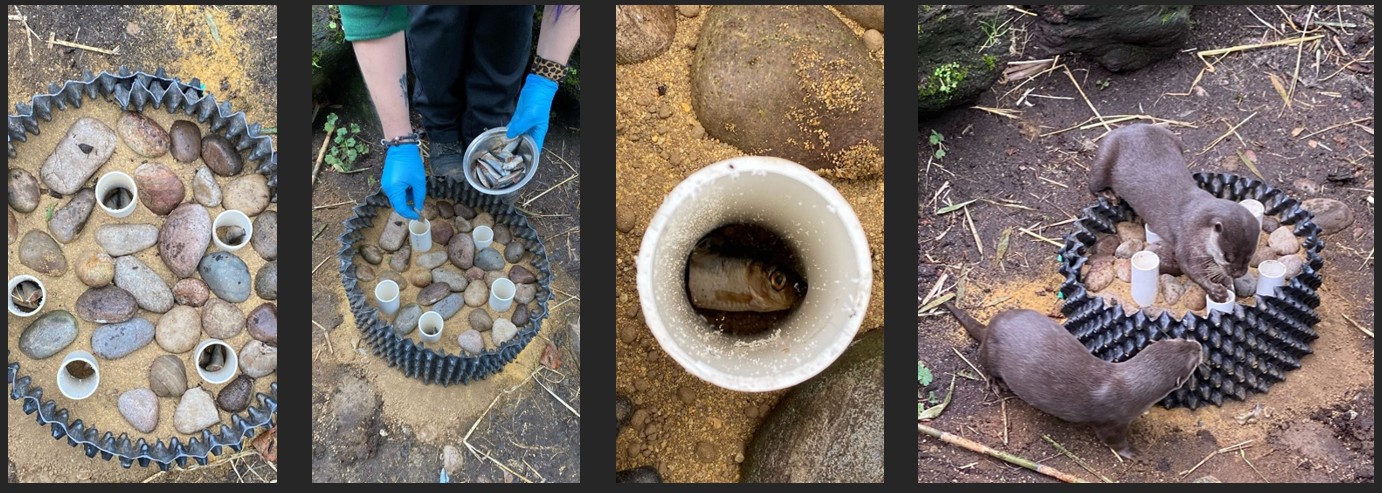Continuing our Love Your Zoo blog series, Maddy Tattersall (Newquay Zoo) is joined by ZSL teams to invent a new enrichment for otters:
Today, May 28th, we celebrate World Otter Day – a perfect opportunity to spotlight a unique, evidence-based otter enrichment project designed collaboratively by teams at Newquay Zoo, London Zoo and Whipsnade Zoo.
Over the past few months, keepers and researchers from these institutions have been co-developing an enriched experience for Asian short-clawed otters, inspired by a fascinating behavioural observation of wild otters foraging for mudskippers at low tide on riverbanks.
Asian short-clawed otters (Aonyx cinereus) are a highly intelligent, social species, making cognitively challenging enrichment essential for improving their well-being in captivity. This project aims to mimic the tidal nature of rivers to observe certain behaviours.
Using the behavioural workflow method, we first identified a set of focal behaviours we wanted to encourage. These included: using eyesight to locate burrows, locomotion prior to resource availability, olfactory detection of prey, social learning, emerging from shelters at ebb tide, reaching inside burrows with both front limbs, grasping and pulling with front paws, washing food, transferring food to mouth, and moving away from conspecifics to consume food. From there, we set about designing a foraging device that could replicate the challenge and complexity of a riverbank at low tide.
The final enrichment input can be presented in two conditions; 1) the device resembles a section of the riverbank, incorporating sediment and plastic tubing to simulate mudskipper burrows, where the tubes will be baited with a portion of the otters’ normal diet and 2) the same as condition one but including environmental cues to create an ‘enriched experience’.

This enrichment has been trialled at Newquay, London and Whipsnade Zoos. Otter interactions with the device are being recorded and analysed using all occurrence sampling, allowing us to clearly identify whether the desired focal behaviours are occurring.
Initial observations have been promising (with full results yet to come), and the otters’ responses have already provided valuable insights into how naturalistic, behaviour-led enrichment can enhance welfare.
Our long-term goal is to use the findings from this study to inform environmental modifications and create a diet presentation plan. The plan will incorporate mudskipper hunting as one of many feeding methods available to care staff with the aim of increasing behavioural variety and providing prolonged enriched experiences through habitat provision and daily management routines, rather than the over-reliance on the addition of novel objects at ‘enrichment time’.
Our findings will be shared across the BIAZA community. So far, Dartmoor Zoo, Colchester Zoo and Battersea Park Children’s Zoo have expressed interest in trialling the device and contributing their own observations and we welcome others!
This project highlights the power of collaboration across institutions, a perfect way to honour Love Your Zoo Week 2025, as well as celebrating otters!
All blogs reflect the views of their author and are not necessarily a reflection of BIAZA's positions
Related Members
-
News
.png?w=100&h=100&zc=1&f=jpeg&hash=60022dc0d0854fa23f80616d64c9376a) Sustainability in poetry - BIAZA Q&A with the author of The Rimba 17th February, 2026This week, BIAZA interviewed author Jane Griffiths and illustrator Emma Lokuciejewski on their recent book ‘The Rimba’ – a poetical…
Sustainability in poetry - BIAZA Q&A with the author of The Rimba 17th February, 2026This week, BIAZA interviewed author Jane Griffiths and illustrator Emma Lokuciejewski on their recent book ‘The Rimba’ – a poetical… -
News
.png?w=100&h=100&zc=1&f=jpeg&hash=49f40af79e569754bae2cce8fe8cd758) Binturong twins join big sister Boots at Drusillas Park 17th February, 2026Keepers at Drusillas Park are celebrating the birth of binturong twins, born on January 2nd, just months after their big sister Boots made history as…
Binturong twins join big sister Boots at Drusillas Park 17th February, 2026Keepers at Drusillas Park are celebrating the birth of binturong twins, born on January 2nd, just months after their big sister Boots made history as… -
News
.png?w=100&h=100&zc=1&f=jpeg&hash=97e6d151315c515d23f80e6ee9d1d533) Love is in the air as pygmy marmoset Tumble arrives at Shaldon Wildlife Trust 13th February, 2026Shaldon Wildlife Trust is celebrating a very small but very special love story this Valentine’s season with the arrival of a new female pygmy marmoset…
Love is in the air as pygmy marmoset Tumble arrives at Shaldon Wildlife Trust 13th February, 2026Shaldon Wildlife Trust is celebrating a very small but very special love story this Valentine’s season with the arrival of a new female pygmy marmoset…

.png?w=100&h=50&zc=1&f=jpeg&hash=7325e4a52b9991d6bf4f68ef8d81a383)

